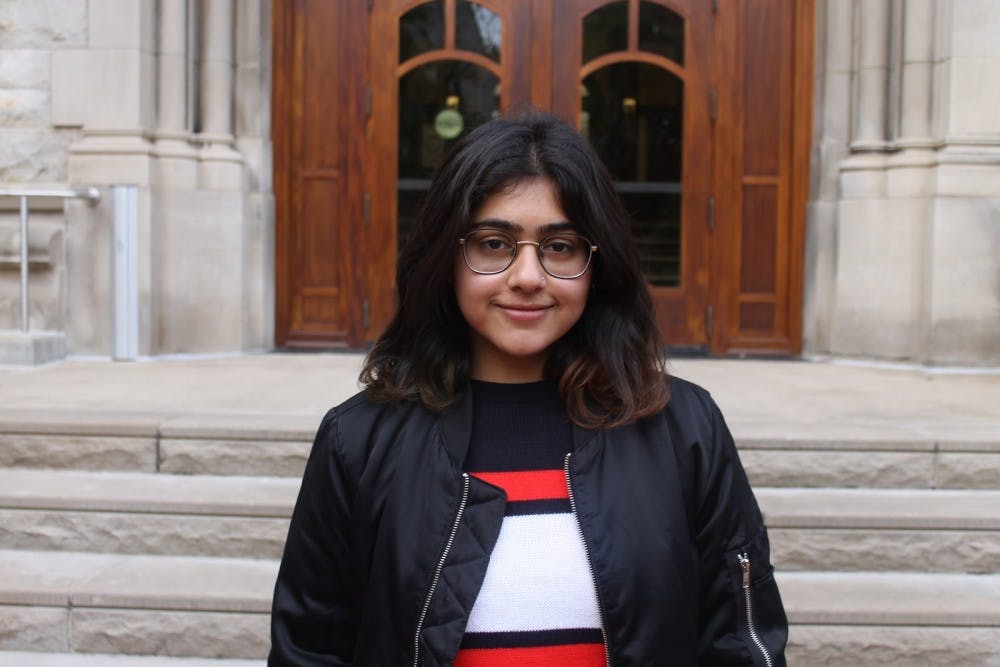When Hyra Basit traveled to IU in 2018, her goal was to learn how to make films to empower women and girls, especially in her homeland of Pakistan. But first, she learned the art of defending them from online harassment.
“In some cases, we have had actual death threats,” Basit said during an interview in 2018.
Recalling her work with the Digital Rights Foundation, Basit said women and girls told her they couldn’t tell their brothers or fathers because they would kill them.
Basit, 24, a graduate student in Design and Production, helped found a cyber harassment helpline for the Digital Rights Foundation in 2016. The foundation is run by lawyers, behavioral health specialists and digital security experts who counsel citizens about online safety and urge politicians to increase resources to local police for investigating cyber harassment. The group works with social media companies such as Facebook and Youtube to remove posts that put citizens in danger.
The helpline provides counsel to anonymous callers who are experiencing online stalking and unsolicited online contact. It also assists those facing threats of physical or sexual violence for having an online presence.
In 2016 Pakistani social-media celebrity Qandeel Baloch, who was known for posting risque photographs and videos online, was drugged and strangled to death by her brother Waseem Azeem in what police said was an honor killing, according to Reuters.
“Girls are born only to stay at home and to bring honor to the family by following family traditions, but Qandeel had never done that,” Azeem told The New Yorker.
Each year in Pakistan, more than 500 people, who are mostly women, lose their lives in honor killings according to a report from Reuters. Honor killings are usually performed by family members who believe the victim’s actions have brought shame to their household and community.
The possibility of posting photographs on social media is a point of contention for many families in Pakistan because it is believed that young women should not be viewed by people without the consent of their parents, Basit said.
“She is the object of the house and everybody has this say on what she can and cannot do," Basit said in reference to young women in Pakistan. "If they somehow find out that she’s active online, then she is immoral. She is not pure anymore.”
Seventy percent of women in Pakistan fear posting personal photos online because the photos could be misused for blackmail, according to a Digital Rights Foundation report released in 2018.
“Even if they know there is no such picture of them online, a random person could just come up to them and be like, ‘If you don’t talk to me, if you don’t meet me, I have these pictures of you and I will send them to your family,’” Basit said. “Without thinking for even a second, they fall into that trap. They are so scared. They give into the blackmailer.”
In most cases, young women do not actually use their real names or photos on social media. According to Basit, they usually use photos of actresses and aliases.
Basit said the Digital Rights Foundation began by starting up digital security awareness sessions in schools, typically for young women between the ages of 17 and 25. The sessions provided information on what online harassment looks like for young women and on rare occasions young men and gave tips on how people can protect themselves.
“After every single session, a bunch of girls would come up to them and be like ‘Oh by the way I haven’t told this to anyone. I can’t tell my friends. I can’t tell my family, but this is what I am facing right now,’” Basit said. “There were way too many cases for me to help individually.”
Members of the foundation decided they needed a larger platform in order to reach the number of young women facing online harassment in Pakistan.
“So the helpline was started and I helped along with my supervisor to literally form everything from the policies to making connections with the law enforcement agencies there, making connections with other helplines around the world,” Basit said.
The cyber harassment helpline fielded 1,908 calls in its first year according to the foundation’s bi-annual report.
“We give psychological support to victims or whoever calls us, digital security help or advice and legal help,” Basit said.
The foundation assists young women in deciding if they need to work with law enforcement for their case, in deleting their presence from the web if necessary and in receiving psychological counseling.
“One of the biggest problems with online harassment is that no one considered the mental toll it takes on you," Basit said. "Especially when you feel like you can’t share this with anyone."
Basit said it is difficult to measure how successful the helpline is because the identity of the women calling is always unknown. The anonymity puts callers at ease because women who call are often concerned the things they say on the helpline might be told to their parents.
“I personally would measure my level of success by every time at the end of a call when a caller would be like: ‘I’m feeling so much better now, I’m feeling hopeful actually,’” Basit said.
Shmyla Khan, project manager of the Digital Rights Foundation, said Hyra’s enthusiasm for helping women made her a perfect fit for the job.
“Hyra is extremely empathetic in the cases that she deals with,” Khan said. “She has endless compassion that translates into the work that she does.”
Basit’s family is not against her using social media.
“My life and the people I’m connected with, it’s a very closed off circle, so my experiences are very different from the experiences of the majority of the people in Pakistan," Basit said. "I would be considered an elite in Pakistan. I am very westernized.”
While Basit’s parents are very supportive of her education and work and have given her lots of freedom, they are still holding onto a cultural practice of which Basit is not a fan: arranged marriage.
“I’ve been trying to avoid it for a good three years now and they were like, ‘Well if you actually want to not get married, go do your master’s,’” Basit said.
Basit wants to complete her master’s degree regardless of an arranged marriage, but it was an incentive to apply, she said.
“However open my parents are or however supportive my parents are, there’s still these things that come up,” Basit said. “It’s just a whole society thing.”






